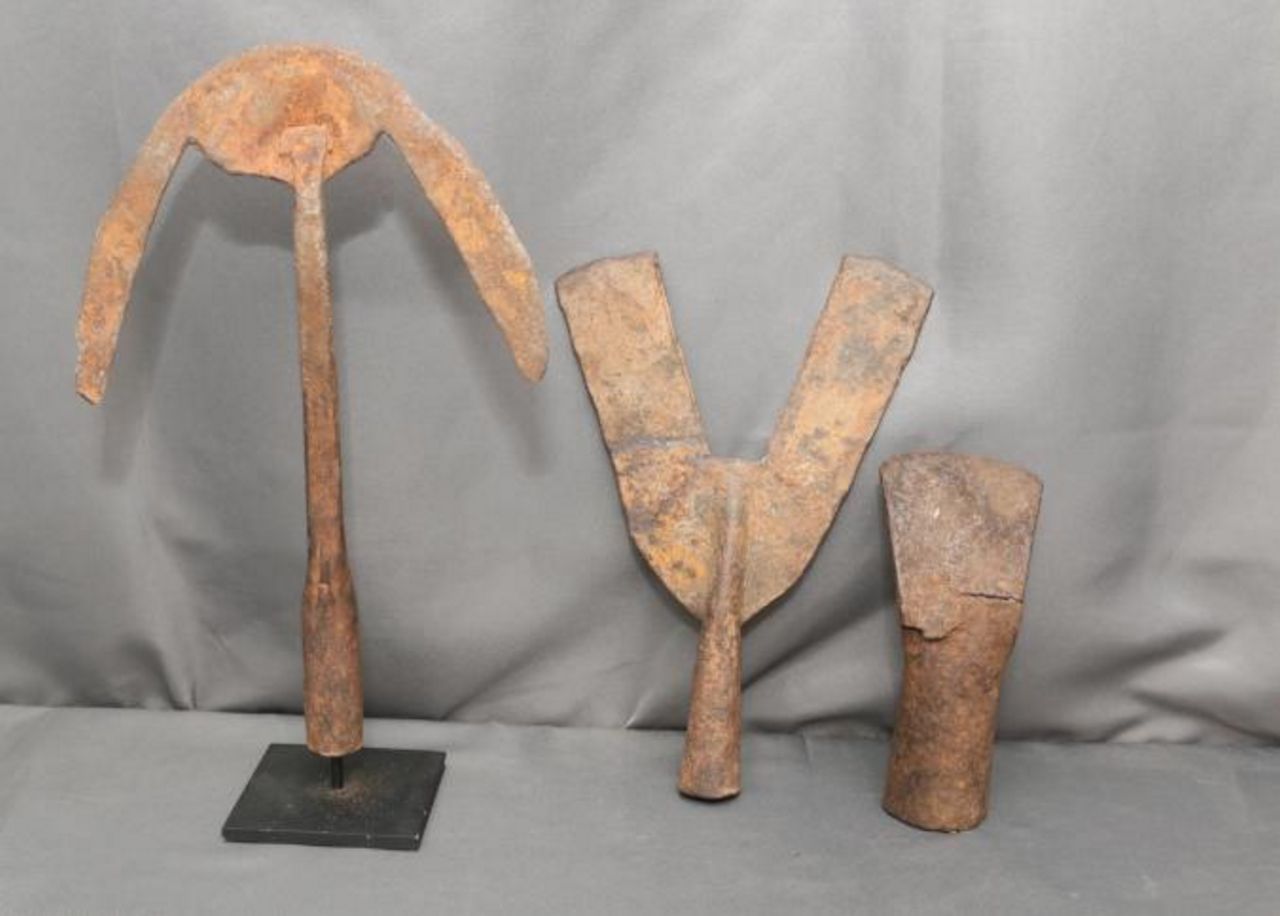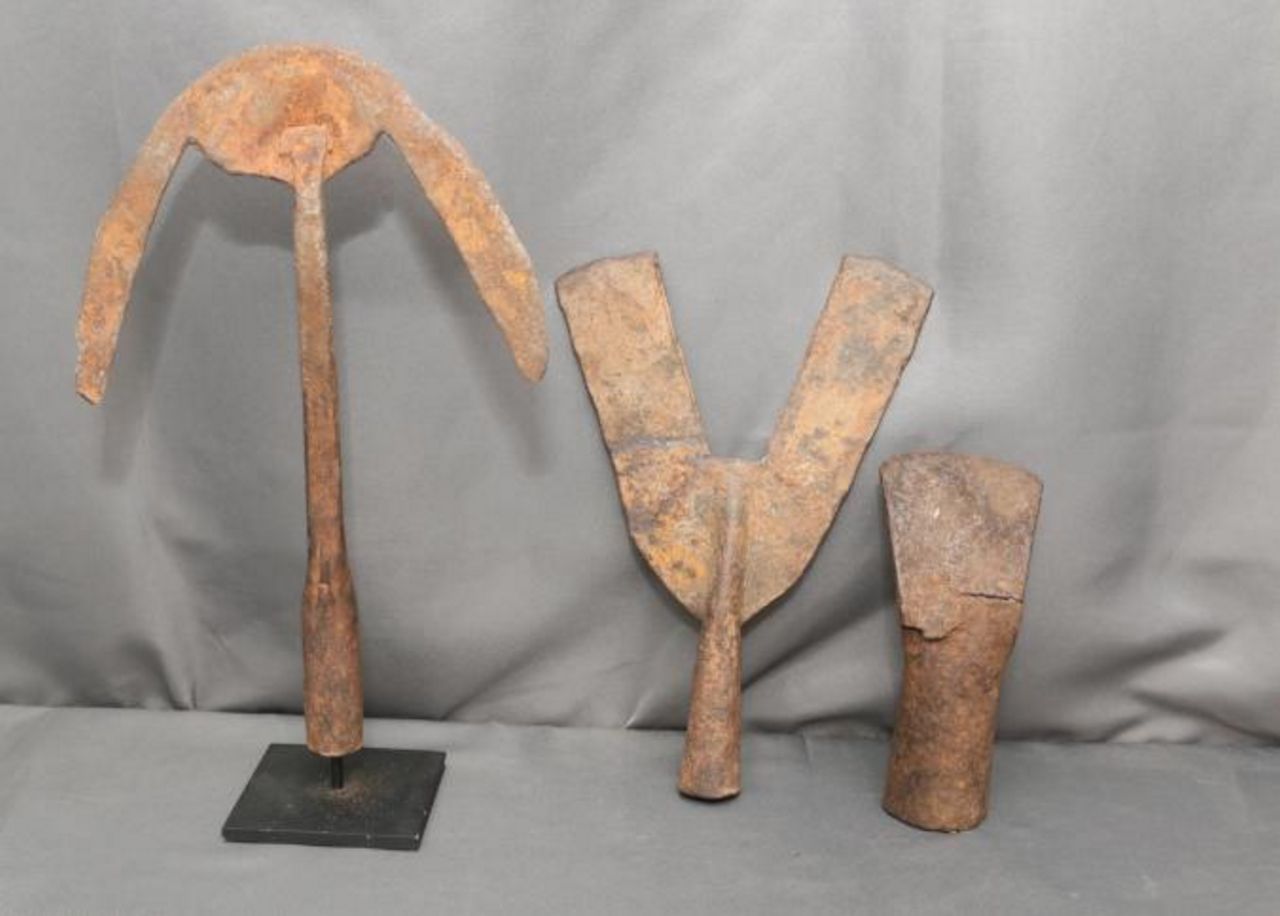Items located in Pleasant Valley, NY. Items include Asafo militia flag, Fante people, Ghana; gong rattle, Chamba people, Cameroon & Nigeria; blacksmith tools, Soninke people, Gambia; ceremonial fetish, Fon people; traditional women's hair pins, Bozo people, Mali; oil lamps, Dogon people, Mali; Cheetem rod currency, Anang people, Nigeria; wedding blanket, Fulani people, Mali or Niger; torque neck ring, Yoruba people, Nigeria; Cache Sexe ring, Kirdipeople, Cameroon & Northeast Nigeria; West African bells, Yoruba People, Nigeria; Duge necklaces, Dogon people, Mali and more.
AFRICAN ART COLLECTION OF MARY SUE AND PAUL PETER ROSEN
Mary Sue and Paul Peter Rosen have collected African art for over thirty years, making nine trips to Africa to study the art in its cultural setting. The Rosens have published three African art books, curated more than ten exhibitions from their collection, and have given public lectures about African art and culture. They have donated art from their collection to various institutions including the Newark Museum, Temple University in Philadelphia, the SMA Fathers African Art Museum in Tenafly, New Jersey, and the African American Research Library in Fort Lauderdale, Florida.
Payment is due by Friday, September 27 at 1PM.
Pickup in Pleasant Valley, NY must be completed by Friday, September 27 at 3PM.
All lots sold as is, where is. There is a 15% Buyers Premium for all lots purchased. Payment methods include cash, MC, Visa, Discover or good check. You can make credit card payment online by going to your Member Area and selecting your invoice.
*NOTE* Shipping is available on all items.
AFRICAN ART COLLECTION OF MARY SUE AND PAUL PETER ROSEN
Mary Sue and Paul Peter Rosen have collected African art for over thirty years, making nine trips to Africa to study the art in its cultural setting. The Rosens have published three African art books, curated more than ten exhibitions from their collection, and have given public lectures about African art and culture. They have donated art from their collection to various institutions including the Newark Museum, Temple University in Philadelphia, the SMA Fathers African Art Museum in Tenafly, New Jersey, and the African American Research Library in Fort Lauderdale, Florida.
Payment is due by Friday, September 27 at 1PM.
Pickup in Pleasant Valley, NY must be completed by Friday, September 27 at 3PM.
All lots sold as is, where is. There is a 15% Buyers Premium for all lots purchased. Payment methods include cash, MC, Visa, Discover or good check. You can make credit card payment online by going to your Member Area and selecting your invoice.
*NOTE* Shipping is available on all items.
Auction Info
Items located in Pleasant Valley, NY. Items include Asafo militia flag, Fante people, Ghana; gong rattle, Chamba people, Cameroon & Nigeria; blacksmith tools, Soninke people, Gambia; ceremonial fetish, Fon people; traditional women's hair pins, Bozo people, Mali; oil lamps, Dogon people, Mali; Cheetem rod currency, Anang people, Nigeria; wedding blanket, Fulani people, Mali or Niger; torque neck ring, Yoruba people, Nigeria; Cache Sexe ring, Kirdipeople, Cameroon & Northeast Nigeria; West African bells, Yoruba People, Nigeria; Duge necklaces, Dogon people, Mali and more.
AFRICAN ART COLLECTION OF MARY SUE AND PAUL PETER ROSEN
Mary Sue and Paul Peter Rosen have collected African art for over thirty years, making nine trips to Africa to study the art in its cultural setting. The Rosens have published three African art books, curated more than ten exhibitions from their collection, and have given public lectures about African art and culture. They have donated art from their collection to various institutions including the Newark Museum, Temple University in Philadelphia, the SMA Fathers African Art Museum in Tenafly, New Jersey, and the African American Research Library in Fort Lauderdale, Florida.
Payment is due by Friday, September 27 at 1PM.
Pickup in Pleasant Valley, NY must be completed by Friday, September 27 at 3PM.
All lots sold as is, where is. There is a 15% Buyers Premium for all lots purchased. Payment methods include cash, MC, Visa, Discover or good check. You can make credit card payment online by going to your Member Area and selecting your invoice.
*NOTE* Shipping is available on all items.
AFRICAN ART COLLECTION OF MARY SUE AND PAUL PETER ROSEN
Mary Sue and Paul Peter Rosen have collected African art for over thirty years, making nine trips to Africa to study the art in its cultural setting. The Rosens have published three African art books, curated more than ten exhibitions from their collection, and have given public lectures about African art and culture. They have donated art from their collection to various institutions including the Newark Museum, Temple University in Philadelphia, the SMA Fathers African Art Museum in Tenafly, New Jersey, and the African American Research Library in Fort Lauderdale, Florida.
Payment is due by Friday, September 27 at 1PM.
Pickup in Pleasant Valley, NY must be completed by Friday, September 27 at 3PM.
All lots sold as is, where is. There is a 15% Buyers Premium for all lots purchased. Payment methods include cash, MC, Visa, Discover or good check. You can make credit card payment online by going to your Member Area and selecting your invoice.
*NOTE* Shipping is available on all items.
Categories:
THREE UNUSUAL WEST AFRICAN HOES. (A) Songhai people, Niger. Called an iler, this type of hoe was adapted to the relatively sandy soil of the Sahel. The socket was seated on a metal shaft. Hand forged iron. The picture shows a Songhai blacksmith attaching a handle to an iler hoe blade that he forged. On custom base. H11. 5in. (B) Hausa people, Nigeria. Shaped like a scoop. Dated to late 1800s. Socket was seated on a wooden handle. Hand forged iron. H6in. (C) Jukun people, Plateau State Nigeria. The Jukun are one of about 40 tribes living in this region. The socket was set on a wooden handle. Hand forged iron. H10in.
More Details
THREE UNUSUAL WEST AFRICAN HOES. (A) Songhai people, Niger. Called an iler, this type of hoe was adapted to the relatively sandy soil of the Sahel. The socket was seated on a metal shaft. Hand forged iron. The picture shows a Songhai blacksmith attaching a handle to an iler hoe blade that he forged. On custom base. H11. 5in. (B) Hausa people, Nigeria. Shaped like a scoop. Dated to late 1800s. Socket was seated on a wooden handle. Hand forged iron. H6in. (C) Jukun people, Plateau State Nigeria. The Jukun are one of about 40 tribes living in this region. The socket was set on a wooden handle. Hand forged iron. H10in.
High Bid:
$60.00 – ibuythings
Auction Type: One Lot
Quantity: 1
Bidding has closed on this lot







